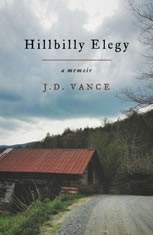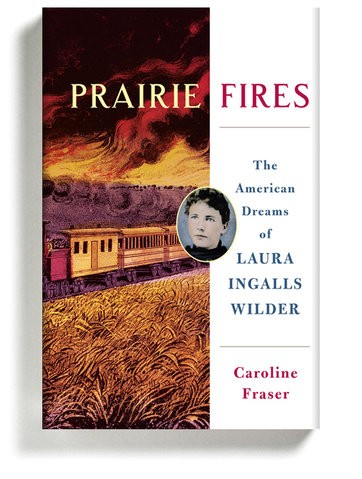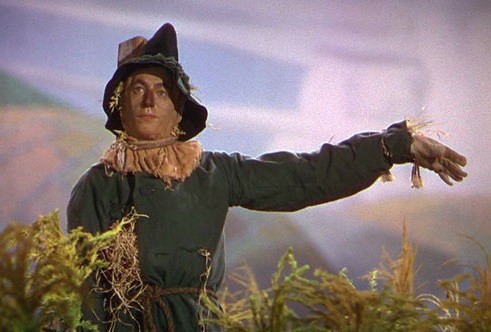Hillbilly Elegy
 J.D. Vance’s Hillbilly Elegy: A Memoir of a Family and Culture in Crisis is the best book I’ve read in a long time. Google the title, or the author’s name, and you’ll discover that it is making news as a treatise on the white working class. Some call it “an explanation of Trump voters.” But I doubt that Mr. Vance would feel comfortable with the title of “explainer.” (There is also no mention of Trump in the book, though in interviews the author is asked about him.) I got the sense that he, too, is asking questions, mulling experience, and trying to understand. His perspective carries weight because it has all the authenticity of lived experience.
J.D. Vance’s Hillbilly Elegy: A Memoir of a Family and Culture in Crisis is the best book I’ve read in a long time. Google the title, or the author’s name, and you’ll discover that it is making news as a treatise on the white working class. Some call it “an explanation of Trump voters.” But I doubt that Mr. Vance would feel comfortable with the title of “explainer.” (There is also no mention of Trump in the book, though in interviews the author is asked about him.) I got the sense that he, too, is asking questions, mulling experience, and trying to understand. His perspective carries weight because it has all the authenticity of lived experience.
A native of Middletown, Ohio, Vance comes from a family of Appalachian “hillbillies.” His grandparents, Mamaw and Papaw, moved from a cripplingly poor county in Kentucky to central Ohio in an effort to improve their chances and those of their children. They largely succeeded, arriving well before the factories closed. But for complex reasons, including an uneasy match between the hillbilly culture they brought with them and their Ohio community, their early financial success not only didn’t last, but was accompanied by a level of personal struggle and family dysfunction that made this author the most unlikely candidate in the world for the life he has attained: a graduate of Ohio State and Yale Law School, a happily married man, and a financially successful member of the professional class.
I admire the way Mr. Vance has been willing to speak for his community before a wider audience. He writes with great honesty, and great love, about the mixed bag of his cultural inheritance: deep devotion to family, yet a broken home and an unstable mother struggling with various addictions and a string of stepfathers; a volatile family life, yet a Scots-Irish honor code that insists on revenge for any perceived slight to you or your family member; a willingness to work hard and a love for country, yet a profound hopelessness in “the system” to ever guarantee success. The picture that emerges is a complex one, and though it brought tears to my eyes at times as I read, the author’s love and concern infused the telling and rendered both reflexive elitism and unfeeling judgment equally impossible. I respect Vance’s clear-eyed refusal to simplify, stereotype, or dismiss his subjects. In no way does he disown his heritage, however many of its hurdles he has cleared.
By far the heroes of the story are Mamaw and Papaw Vance, the author’s grandparents. They became Vance’s unofficial guardians and provided the stability, or as he calls it, the “safety valve,” in an otherwise chaotic and sometimes dangerous personal world. Though they have plenty of rough edges and failures, Vance sees his upward trajectory as directly attributable to them. After his grandfather dies, Vance lives with his grandmother for several years, and her steady encouragement and love enables him to begin redeeming himself as a high school student. He joins the Marines, where he learns discipline as well as a number of greatly needed life skills, and from there he is on his way up.
So why aren’t more from the white working class experiencing the kind of upward mobility Vance is? He offers no all-encompassing answer, but he does point to both systemic problems working on the community from without, and personal agency of those within the community. His discussion includes, among other things, the influence of Christianity, class, family, and politics both left and right. While the book is inspiring and gives me lots to think about, it does nothing to abate the concern I feel for our country or for my own family. On the contrary, it acknowledges some of the great divides among us. But it does so in a way that opens dialogue and advances the discussion in a disarmingly personal, civil way. Hillbilly Elegy does what all the best books do: it unsettles me, it brings others into sharper focus, and it makes me think about how similar and how connected we really are. These days, we can’t hear enough of such reminders.



3 Comments
Carol in Oregon
I’m waiting to get this through an interlibrary loan. Your review makes me want to pony up and pay for the book!
Janet
Our library system was my first inclination too, but it doesn’t yet have a copy…
It’s rare to find an author who speaks with both such love and such even-handedness. I think this book will end up being important over the long haul. It does more for the white working class than any politician has in decades, simply by giving the community a voice.
Alice@Supratentorial
My pastor just read this and has been trying to get everyone he knows to read it as well. I think it’s going to have to move up the TBR list.